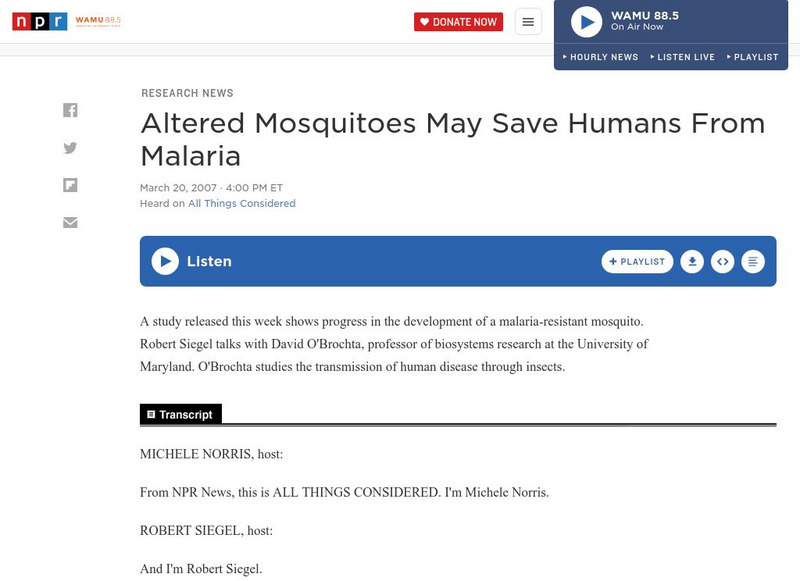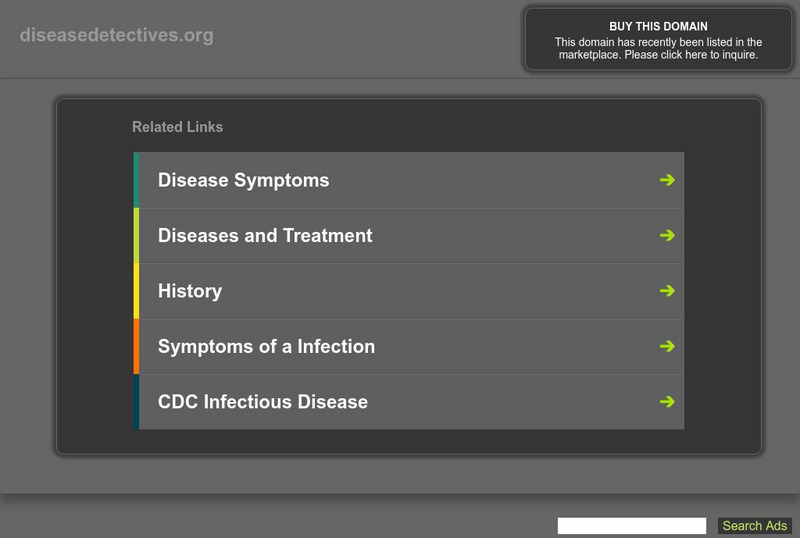Climate Literacy
Clean: Climate Change and Disease
Students research the relationship between hosts, parasites, and vectors for common vector-borne diseases and evaluate how climate change could affect the spread of disease.
Other
Evolution: The Theory of Natural Selection (Part 1)
These pages are part of a site called Evolution that accompany a textbook by the same name. Mark Ridley is the author. This section has an advanced discussion of determining allele and genotype frequencies using the Hardy-Weinberg ratio.
US Fish and Wildlife Service
Chlorinated Hydrocarbons (Organochlorines) Ddt
Read a brief history of the use of DDT in the United States, its effect on wildlife, and the banning of the toxin in 1972 by the EPA.
PBS
Pbs News Hour Extra: Nine Deadly Diseases That Plagued the World
Students investigate nine deadly disease by examining George Washington's medical records. Students will also use the Center for Disease Control website to identify where these nine deadly diseases are prevalent in the world today.
PBS
Pbs Teachers: Crisis in Sudan: Responding to Medical Emergencies
Investigate the medical nature of the humanitarian crisis in the Darfur region of Sudan. Describe the nature of cholera, malaria, hepatitis E, Ebola and malnutrition, which have been of major concern to humanitarian aid personnel in this...
United Nations
United Nations Cyberschoolbus: Fighting Disease
The United Nations has distributed this list to make school age children aware of the communicable diseases that have most recently had an effect on society. Good descriptions are provided for each of the 11 diseases.
New York Times
New York Times: Fighting an Old Scourge
This interactive resource discusses malaria in Uganda. It gives pictures, audio, and video to depict the problems that the Ugandan government is having fighting the spread of this illness. It tells how they are beginning to use new...
Independence Hall Association
U.s. History: Britain in the New World: Jamestown Settlement
Jamestown, although not a financial sucess, was the first succesful English colony in North America. Find out how the colony was financed, what the first colonists hoped to find, how the colony was governed, and the hardships that were...
University of Wisconsin
The Why Files: Transferring Diseases by Mosquitoes
Discover how mosquitoes affect human health and why they are such good carriers of disease.
NPR: National Public Radio
Npr: New Malarial Therapy Reaches Remote Africa
Details efforts by Doctors Without Borders to bring state of the art malaria treatments to some of the most remote parts of Africa ( available in audio format). Also provides links to related sites.
NPR: National Public Radio
Npr: Altered Mosquitoes May Save Humans From Malaria
A March 2007 interview [4:00] with a professor of biosystems research at the University of Maryland on the use of genetically altered mosquitoes to fight the spread of malaria. Provides links to related topics.
Read Works
Read Works: Final Push
[Free Registration/Login Required] This passage discusses the effort to eradicate polio, an effort supported by Bill Gates. This passage is a stand-alone curricular piece that reinforces essential reading skills and strategies and...
Read Works
Read Works: Royal Pain
[Free Registration/Login Required] An informational text about King Tut and what may have caused his death. A question sheet is available to help students build skills in reading comprehension.
Read Works
Read Works: Stopping the Spread
[Free Registration/Login Required] An informational text about scientists working on a vaccine against malaria. A question sheet is available to help students build skills in reading comprehension.
CK-12 Foundation
Ck 12: Biology: Protists and Human Disease
[Free Registration/Login may be required to access all resource tools.] Discusses how protists cause human disease.
NASA
Nasa Earth Observatory: Mapping Malaria
This article demonstrates how by mapping malaria outbreaks, the local governments would be capable of spraying these houses with insecticides and reducing malaria outbreaks by half. Medical databases and airplane photographs help...
The Association of the British Pharmaceutical Industry
Abpi: Infectious Diseases
A self-paced lesson on infectious diseases including bacterial, fungal, viral, and parasitic infections. Each disease featured discusses symptoms and treatment.
Other
Disease Detectives: Microbe Gallery
Learn in-depth details about microbes that cause disease: what is it, how to avoid it, the symptoms, and how it causes infections.
University Corporation for Atmospheric Research
Ucar: Climate Change and Vector Borne Disease
Vector-borne diseases are transmitted typically by the bite of an infected arthropod. Climate plays an important role in the seasonal pattern or temporal distribution of diseases that are carried and transmitted through vectors because...
Khan Academy
Khan Academy: Nclex Rn Questions on Malaria 2
This is a four-question quiz to prepare for NCLEX-RN on malaria.
National Earth Science Teachers Association
Windows to the Universe: Changing Planet: Infectious Diseases Classroom Activity
Students will be introduced to the topic of infectious diseases in this lesson plan. While learning about how infectious diseases spread, they will learn how climate change is affecting the impact of these diseases. Includes printable...
Khan Academy
Khan Academy: Unit: Infectious Diseases
Introduction to a unit of lessons on the following infectious diseases: Tuberculosis, Pertussis, Influenza, Polio, Sexually Transmitted Diseases, HIV and AIDS, Malaria.
Khan Academy
Khan Academy: What Is Malaria?
Malaria is an infectious disease caused by a parasite called Plasmodium that invades red blood cells and liver cells. The parasites are transferred to humans by the bite of an infected Anopheles mosquito. The article discusses how...




















